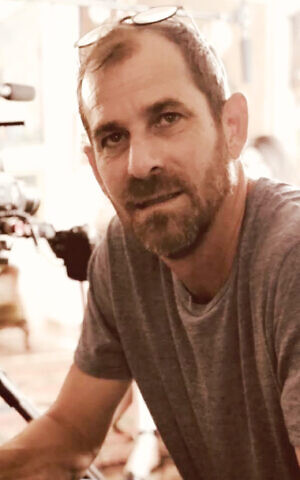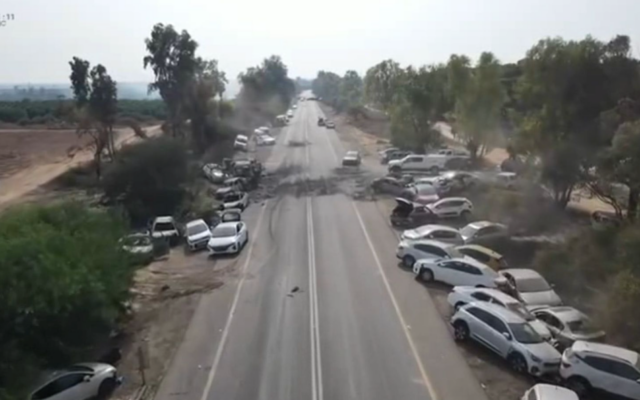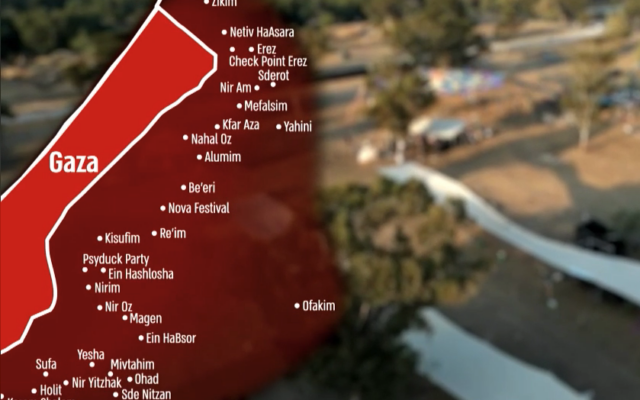Supernova Film Captures Gripping Israel Tragedy
Documentary is a graphic and dramatic account of the brutal Oct. 7 attack by Hamas.
In the Israeli documentary, “Supernova: The Music Festival Massacres,” Ilan Regev plays back a recording of the frantic call he received at his home in Israel from his 21-year-old daughter Maya on Oct 7.
“Dad, they shot me, they shot me!”, she is heard screaming into her phone. “He is killing us, Dad, he is killing us.”
The documentary, which had its North American premiere at the Atlanta Jewish Film Festival last month, crackles with a heart-stopping sense of immediacy and drama. Much of what takes place is a minute-by-minute reconstruction of the atrocities that occurred when dozens of Hamas gunmen swept into the lightly guarded open-air festival site three miles from the border with Gaza.

From recordings made by some of the Israeli victims of the attack and from footage posted by Hamas on social media, the film brings us a close-up view of the horrors of that day. Many of the scenes show the murder, in chilling detail, of some of the 364 victims of the attack at the site and of the 40 others who were taken hostage from the festival by Hamas that day.
Reviewing the scenes of the carnage took its toll on the co-director of the film Duki Dror, the Israeli filmmaker who started putting the production together within days of the attack.
In the discussion that followed the AJFF screening last month, Dror admitted that the experience touched him deeply.
“I was traumatized for sure. I had a few meltdowns. A good friend told me it was not unlike the trauma, the PTSD, that occurred when you work on projects about war, like in Vietnam. It was very vivid for me.”
For Dov Wilker, Southeast Regional Director of the American Jewish Committee who interviewed Dror for the film festival program, the documentary revived recent impressions of Israel.
Wilker was one of the two dozen community leaders and rabbis who last month visited the communities where the attacks took place. He feels that despite the shocking nature of the film, it carries an important reminder for us at this time of year.
“The important message here is the notion that Hamas really is out there to kill us. It’s an important reminder for us as Jews as we approach the holiday of Passover. Each year at our seder tables, we remind ourselves about freedom and our struggle for survival. And this is, sadly, yet another example of that struggle.”

Since its premiere in Atlanta, the film has had a number of screenings in major American cities. It has been bought by the BBC World Service and television networks in at least a half dozen European countries. The film is a pay-per-view offering on Vimeo.
There is a free screening available on YouTube of a documentary, “#Nova,” which is also about the music festival attack. It has had the most views in the history of Yes TV, a well-known Israel broadcast and streamer.
The important message here is the notion that Hamas really is out there to kill us. It’s an important reminder for us as Jews as we approach the holiday of Passover. Each year at our seder tables, we remind ourselves about freedom and our struggle for survival. And this is, sadly, yet another example of that struggle.
Atlanta’s Israel Consulate, in 30 screenings around the South, has shown its own version of the documentary footage of the attack on the Supernova festival as well as several kibbutzim in southern Israel. The latest showing, to a small, carefully vetted audience in Midtown on March 14, contained scenes that were, if anything, even more horrific than are available in the commercial productions.
Among those attending the Atlanta consulate event was 85-year-old Robert Ratonyi, who survived the Holocaust as a young child in Hungary. Fifteen members of his family, including his father, died at the hands of the Nazis and their Hungarian collaborators. Today, seven of his cousins survive in Israel. Several of them live in border areas of Israel and have been evacuated from their home while the war continues.
He maintains that what separates the murders during the Holocaust from the recent atrocities by Hamas is in the way the Islamic extremists rejoiced in the killings.
“There was joy in these social media messages that Hamas was sending back to their friends and family in Gaza,” Ratonyi pointed out. “I’ve never witnessed that, even with the Nazis. Towards the end of the war, the Germans were trying to hide it. The Hamas terrorists were proud of what they did. They wished they could have killed more Jews.”
The impact of all that has happened in the last six months has taken its toll on community leaders like Dov Wilker. He considers the week following the attacks of Oct. 7 to be among his most difficult in recent memory.
“There was a collective sense of pain that we all had then,” Wilker says. “And I think for the past six months, it really has forced us to consider who we are as Jews and how we survive as a people.”




comments